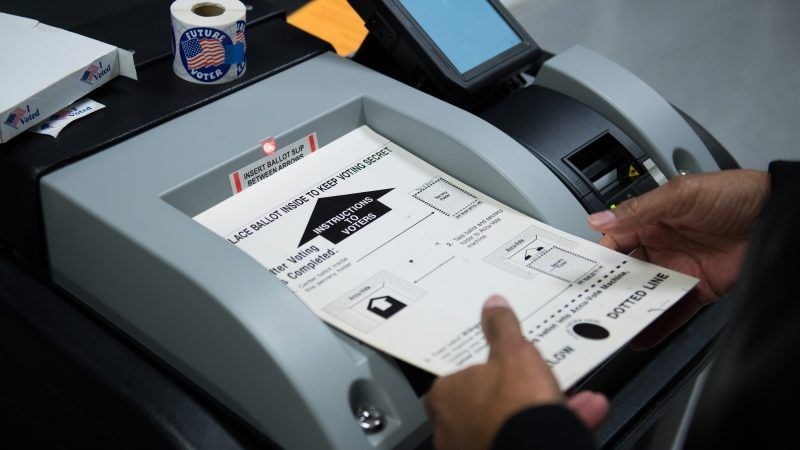Media Overhypes Russian Hacking, Again
Plus: human trafficking victims arrested in Florida, Beyoncé and Domino's targeted by disability discrimination suits, and more...

The headlines sound pretty bad. "Russia Targeted Elections Systems in All 50 States," says The New York Times. "New Senate Intelligence report shows 'extensive' Russia 2016 election interference," reports Vox.
What these and many other fearmongering headlines leave out is that while Russians may have targeted state elections systems in 2016, there's zero evidence that they actually managed to interfere. We have no reason to believe that votes were changed or deleted, that voters were purged from rolls, that voter information was modified. And the assessment that all 50 states were targeted is just a guess—according to the Senate Intelligence Committee report, officials could not "ascertain a pattern to the states targeted, lending credence to [Homeland Security's] latest assessment that all 50 states probably were scanned."
What the report does say is that Russia conducted "an unprecedented level of activity against state election infrastructure," potentially to try and find vulnerabilities. But actually finding those vulnerabilities is another thing.
According to the report—released Thursday with extensive redactions—there were only two states, including Illinois, where "Russian-affiliated cyber actors gained access to election infrastructure systems" and accomplished some "successful extraction of voter data. However, none of these systems were involved in vote tallying." Much of this interference took place after the 2016 election.
Mostly, Moscow is accused of a "reconnaissance" mission in which it snooped on how states' election-related infrastructure was set up. The report quotes Samuel Liles, who told the committee that most of the activity was "simple scanning for vulnerabilities, analogous to somebody walking down the street and looking to see if you are home. A small number of systems were unsuccessfully exploited, as though somebody had rattled the doorknob but was unable to get in."
The report says many states have "interpreted the events of 2016 as a success story: firewalls deflected the hostile activity, as they were supposed to, so the threat was not an issue."
"While the Committee does not know with confidence what Moscow's intentions were, Russia may have been probing vulnerabilities in voting systems to exploit later," it continues. "Alternatively, Moscow may have sought to undermine confidence in the 2016 U.S. elections simply through the discovery of their activity."
The attempts alone certainly aren't reassuring—especially when coupled with the fact that, as Robert Mueller put in Wednesday, other "countries are developing capability to replicate what the Russians have done." It presents a strong case that we need to continue shoring up our election infrastructure and to be vigilant about potential threats. (To this end, Congress has already approved $380 million in grants to aid states in making their systems more secure, and Homeland Security has been working with states to "deploy resources to assist in securing elections." )
But it's disingenuous to hype the new Senate report as some sort of bombshell or to imply, as many outlets have done in their headlines and opening paragraphs, that Russia did more than merely target state election systems. The report states on the first page that the Senate Intelligence Committee "has seen no evidence that any voters were changed or that any voting machines were manipulated."
The Times says that "some administration officials have suggested that the issue is not getting enough high-level attention because President Trump equates any public discussion of malign Russian election activity with questions about the legitimacy of his victory." Trump wouldn't be entirely wrong there, to judge from some of the more breathless reporting on this story.
FREE MINDS
Polk County, Florida, arrests victims of sexual exploitation. Another "anti–sex trafficking" sting in Florida that's actually aimed at adults engaging in voluntary activity. Dubbed "Operation No Spring Fling," the Polk County operation led to 154 arrests. Sheriff Grady Judd said the primary goal of the sting was "to rescue victims of human trafficking and to arrest people that are buying human beings." Instead, Judd and his team arrested the victims, as The Appeal reports:
three people out of the 154 arrested as a result of the sting were considered possible victims of human trafficking. Of those, two women, a 17-year-old and a 23-year-old, were charged with unspecific crimes. The vast majority of people arrested…were charged with solicitation, and their mugshots were displayed on a banner during the sheriff's press conference and subsequently published online by local newspapers.
More here.
FREE MARKETS
Websites are being targeted with lawsuits for violating the Americans with Disabilities Act if they are not accessible to blind visitors. The issue may make it to the U.S. Supreme Court. From CNBC:
Businesses, including Domino's, say the lawsuits are a nuisance, and argue that the federal government has not yet put out rules governing how to make their web platforms ADA compliant. But disabled groups and individuals argue that clear international standards exist, and companies must follow them or find another way to make their sites accessible.
CNBC notes that "the official website for Beyonce is among the many targeted by accessibility lawsuits."
QUICK HITS
- The Department of Justice announced yesterday that after two decades, it would be reinstating the federal death penalty. Rep. Ayanna Pressley (D–Mass.) quickly announced a bill to ban this.
- "My two newest colleagues are very decent, very smart individuals," said Supreme Court Justice Ruth Bader Ginsburg of Brett Kavanaugh and Neil Gorsuch.
- Listen to Reason Editor-at-Large Nick Gillespie interview newly non-Republican Rep. Justin Amash.
- Why isn't Microsoft being targeted as part of the political crackdown on "Big Tech"?
- 3D-printing could "make baldness obsolete."


Show Comments (92)